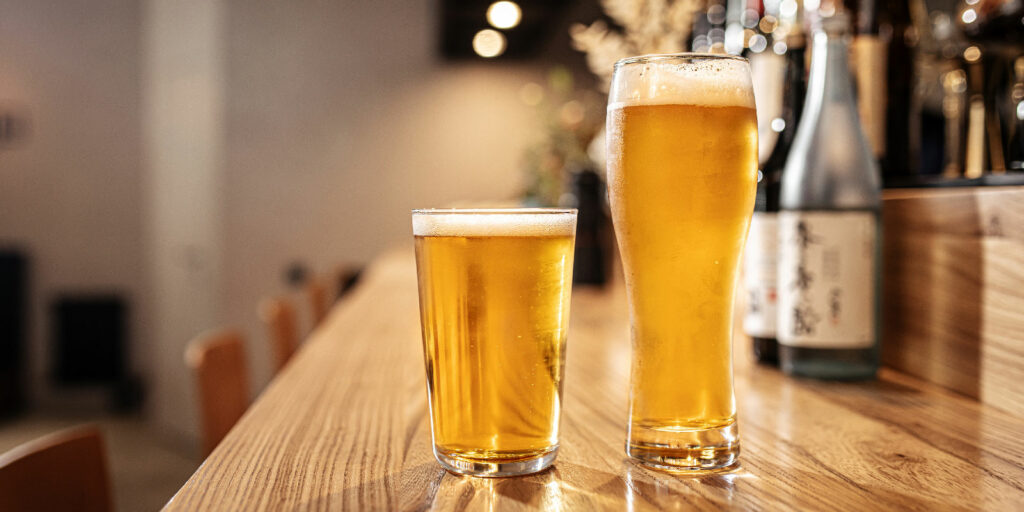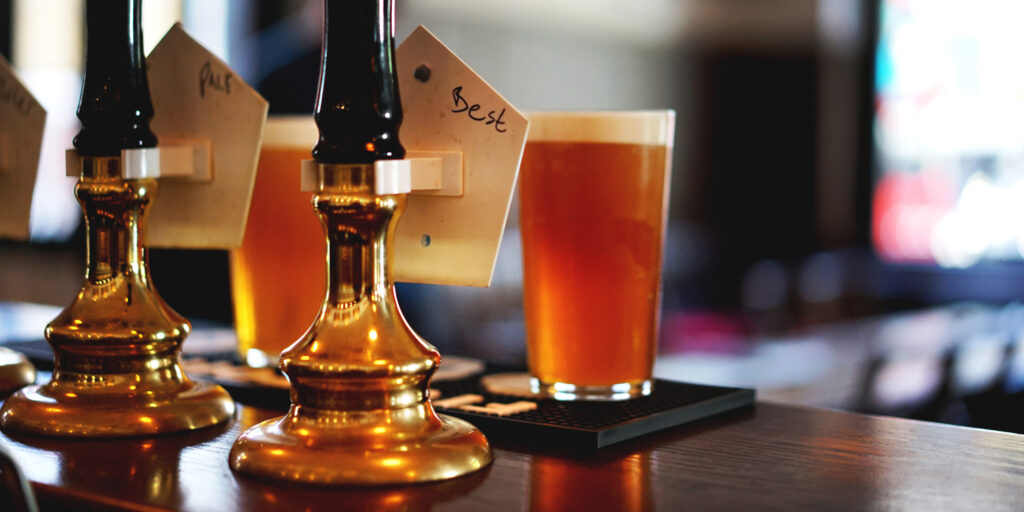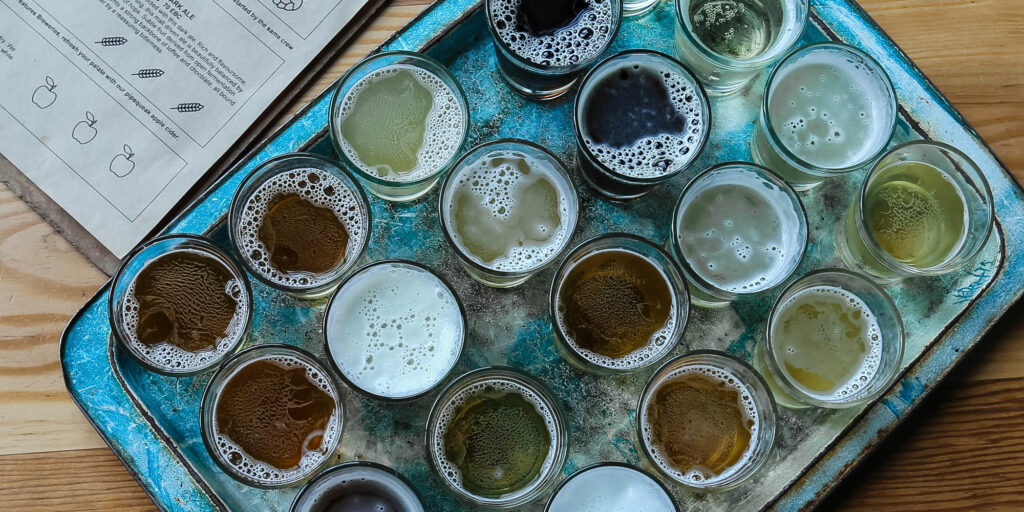Matthew Curtis’ Predictions for Beer in 2024
We asked our resident beer writer, Matthew Curtis to dust off his crystal ball, peer through the haze and into what lies ahead for the beer industry. Here’s what the cosmos revealed to him on beer trends in 2024.

Making predictions about what might lie ahead in the future of the beer industry is a bit like shooting fish in a barrel. Trends are, more often than not, cyclical. Just look at 90s fashion – who’d have ever thought that skirts over jeans would become a thing again? Remarkably, Gen Z has found a way.
It’s a bit like the resurgence of best bitter, in a roundabout way. Something that was revered by a particular generation, then initially considered to be outdated, even ridiculous, by those who came next, only for some people to start figuring out that it’s actually pretty good, and thus the cycle begins anew. So much of what is fashionable about beer, for however briefly, has more often than not already come before. Sometimes it takes a generation to understand it and believe they are making it their own before it can become a trend.
I’ve seen lager touted as the next big thing in beer for each of the 10 years I’ve been writing about it. In fact, I’d go so far as to say that those who were doing so (admittedly, myself included) weren’t merely seeing a trend, but were attempting to manifest one. Beer has this uncanny habit of getting stuck in a rut. One of the genuinely new trends of the past few years has been the emergence of hazy pale ales and IPAs, which has ultimately left us with a lot of breweries making beer that looks, smells and tastes very similar. It’s no wonder that those tasked with writing about it would ‘predict’ something that is its antithesis. Lo and behold, a lot of British breweries are now making exceptional lagers.
My own predictions for where beer might head next year are a little bit of column A, and a little bit of column B. There are things I see happening that are based on visible evidence, such as the increasing popularity of traditional styles like bitter and mild, served on cask. And there are things that I don’t see much evidence of – yet – like the return to popularity of Belgian beer styles, and more British and Irish breweries making green hop beers in autumn. But I’d really like to, so their inclusion is perhaps an attempt to make these things happen through sheer force of will.
Here are five predictions for what I believe the future may hold for beer in the UK in 2024. Another tough year undoubtedly lies ahead for British breweries, but I also expect the next twelve months to throw up a few surprises. Ever the optimist, I also believe that there will be a good amount of positives as breweries continue to work their way through some of the most challenging trading conditions those working in the industry can probably remember.
The Traditional Beer Revival Continues Apace
Suarez Family Brewery in upper New York State is one of my favourite American breweries. They are perhaps best known for their lagers such as Palatine Pils and Qualify Pils, both of which are exceptional examples of the style. More recently though, after a trip to the UK, head brewer Dan Suarez has been heavily invested in recreating some of his favourite British styles of beer. In November his brewery released Be It Known, an Old Ale inspired by beers such as Theakston’s Old Peculier, and Robinson’s Old Tom.
There has undoubtedly been a surge in the popularity of traditional British beers among smaller breweries this year, perhaps borne out of fatigue experienced by beer enthusiasts who want something simple, something proper. I am one of them. This year my eyes have barely glanced at the keg boards as cask has taken centre stage. I have crossed town to get myself a pint of Timothy Taylor’s Boltmaker, or Rudgate Ruby Mild. Once upon a time I would have seen these beers as old hat, but at present they are central to my enjoyment of beer.
Several modern breweries, from Track and Cloudwater in Manchester, to Deya in Cheltenham and Beak in Lewes have enjoyed recreating historical styles to be served on cask in 2023. From Bitters and Milds, to Brown Ales and Porters, seeing these beers on the bar has brought genuine delight. It feels like contemporary UK brewing has finally reached a point of maturity where it’s able to properly respect what came before it, and not merely try to rail against it, and force a point of difference.
My feeling is that if breweries like Suarez in the US, and some of the UKs leading lights as mentioned above are investing their time and energy in creating traditional British styles of beer, will see even more of this sort of thing in 2024. It’s worth remembering though, that when it comes to tradition, it’s often best to start with the originals. With that, I’m off for an Old Peculier.

Belgian Beer Becomes Popular Again
I’m a big believer that one trend can serve as a catalyst for another, and so if traditional British styles can return to vogue, so too can Belgian classics like Dubbel, Tripel and Saison. Purists may argue that these sorts of beers haven’t gone anywhere, and they’re probably right. But I don’t think the excitement around Belgian beer is what it was five or ten years ago. In my early days as a beer blogger, I’d enthusiastically take trips to Brussels and Bruges, merrily sipping away on strong beers inside the country’s famous brown cafés. I don’t quite have that same spark at the moment. Although, the other week I got myself a bottle of Oerbier from De Dolle brewery, and thought to myself “I need to start drinking more of this again.”
Modern styles, such as those aforementioned hazy IPAs that have dominated instagram feeds for the last few years, have helped a lot of people find their own enthusiasm for beer. My feeling is that this group – who are perhaps newer to beer than some of us who could possibly be described as “jaded” – will start to look elsewhere for that surge of excitement the latest fussed over cans of DIPA don’t seem to bring them anymore. Belgian beer is an obvious stepping off point for me: strong, complex, intriguingly flavoured beers that are absolutely delicious. Perhaps this is even a point where modern beer fans and traditionalists might find some common ground in the months to come.
UK Breweries Properly Celebrate Green Hop Season
Ok, perhaps this is a little bit of wishful thinking on my part, but after I wrote about my frustration over not enough British breweries selling green hop beer around the time of the hop harvest, I started to notice quite a few who were making these beers. It might have been a case of the Baader-Meinhof phenomenon because I was suddenly thinking about it more often, or it could be a sign that an increasing number of breweries understand the value of green hop beers, and how their creation supports British hop farming.
One important conversation I hope we have in 2024 is about the dire circumstances the UK hop industry is facing, as more farmers grub up their fields in favour of more profitable crops such as fruit, vegetables or cereals, or simply retire without a successor. Hop farming is an incredibly important part of British culture, but with our yields only accounting for what was reportedly just 0.3% of the global harvest in 2023, it shows how insignificant British hop farms are when compared to their global competitors.
More UK breweries making more green hop beers come September and October would almost certainly help shine a light on our indigenous hop varieties, and how versatile they are. It’s also a great opportunity to celebrate the importance of agriculture, and its connection to brewing.
Inflation Pushes the Price of Beer Ever Higher
As I write this, the UK inflation rate has tumbled down to a mere 3.9% – however, this is still almost double the 2% target set by the Bank of England. In terms of the effects of high inflation to beer, the damage has already been done. Despite wild (and irrefutably false) claims by the UK government at in the autumn budget – where they claimed beer was going to be 3p a pint cheaper – the cost of beer is only going to rise. Brewers have seen the cost of everything, from ingredients and raw materials, to cardboard (which has increased in price by a staggering 300% in the past year) increase. Further increases will be administered next year with new cost rises such as an increase to the National Living Wage (definitely a positive, don’t get me wrong) fuelling further price rises.
The biggest issue is that years of high inflation have left us, the drinkers, without very much in our pockets. It’s all well and good telling you that the price of beer is going up, because if it doesn’t a lot of breweries will be closing their shutters for good. It will probably take a few more months, or more realistically years, before our disposable income returns to a level where enjoying a few beers is something we can take for granted. Until it does, breweries – especially small independents – will continue to struggle.

Light at the End of the Tunnel?
One thing I can pretty confidently predict will happen in the UK during 2024 is a general election. And what I predict (or more accurately, hope) we will see is a change in government. While this probably won’t have an immediate, tangible effect on the beer industry, what I do think might happen is that a government operating with what are hopefully better researched, more fiscally sound financial policies might go a long way towards stabilising the market. This should eventually make operating less challenging for small breweries and independent pubs, bars and bottle shops.
This comes back to the fact we all could do with a bit more money in our pockets, because that’s what breweries – in fact all businesses – really need. It’s impossible to predict what will actually happen post election night, but the optimist in me says it surely has to be a net positive, because I find it difficult to believe things could get even worse than they are now.
Of course, even with change like this many industry problems will remain. That’s why we need the independent sector of the beer industry to get back on stable footing. Then we can concentrate our energy on more important issues, like tied lines and the lack of access to market that’s holding the entire UK industry back, and no more so than in Northern Ireland.
Fingers crossed that beer has a great 2024. It absolutely, positively deserves it.
— Matthew Curtis